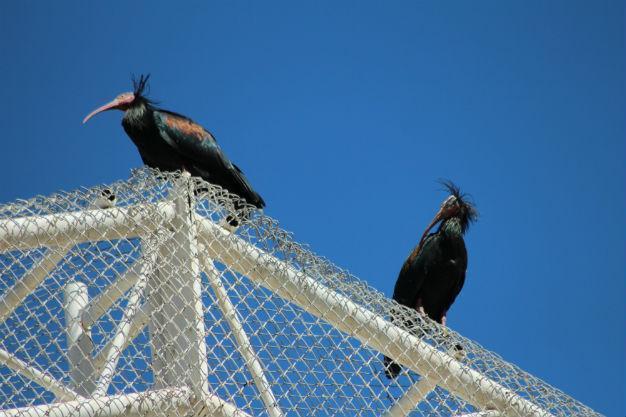War in Syria prevents bird migration
ŞANIURFA – Anadolu Agency

AA photo
A number of critically endangered northern bald ibises, considered a “symbol of abundance” in the southeastern province of Şanlıurfa, are waiting for the war in Syria to end before they migrate.
The Bald İbis Reproduction Center, which was established in 1977 in the city’s Birecik district, carries out efforts to allow these birds to survive and reproduce.
The center feeds them a special diet including fat-free ground meat, boiled eggs, grated carrots, chicken feed and unsalted cheese.
In the spring months, when the birds’ reproduction season begins, the bald ibises are released into their natural habitat on the banks of the Fırat River but when the migration season starts, they are collected and put into cages to prevent them from migrating to the Middle East.
The birds are being followed daily by teams from the General Directorate of Nature Conversation and National Parks. With transmitters on their feet, the birds will only be sent on their migration routes after the war in Syria and the conflicts in the Middle East end.
General Directorate of Nature Conversation and National Parks 3rd Region Director İsrafil Erdoğan said thanks to their efforts, the number of animals at the station has been increasing every year.
He said the birds in the station were closely monitored, and added, “Because of disinfestation against malaria and other diseases in the 1950s, biological diversity disappeared. Bald ibises are in danger of extinction in the world. In Turkey they are only living in Birecik. Eleven birds were caught in 1977 and put into the station. Now the number is 205.”
Erdoğan said they had observed in previous years that dangerous chemicals in materials the birds had collected to make their nests had caused them to die. “This is why we provide the materials for these birds to make their nests,” he said.
When the birds do not come back
Erdoğan said in previous years the bald ibises were allowed to migrate with transmitters on their feet but some of them did not come back. “We took measures to prevent loss this year,” he said, and continued:
“These are migratory birds. We put transmitters [on their feet] in previous years in order to understand which route they followed during their migration. Our inspections showed that some of them were shot by hunters and some died on their route, because they fly over Syria and come back to Birecik in the spring months. Because of conflicts in the region, we decided not to allow them to migrate. When the [migration] season comes, we put these birds in cages to prevent migration. During this process, we feed them. Officials are very sensitive about this issue. Their feces are analyzed every day to see if there is a disease [present in the birds]. If a disease is found, all of them receive care and are treated. If peace comes to the Middle East and we can be sure of their safety, we can send them out again to migrate in future years, but we won’t let all of them go. We choose adults among them to preserve.”
Erdoğan said they expected the number of bald ibises to increase at the station, adding they had taken measures against potential threats the animals could face.
Only in Morocco and Turkey
Northern bald ibises, which only exist in Turkey and Morocco, are scientifically known as “geronticus eremita” and have a bald head and hair on their neck. They survive on the banks of the Fırat River in Birecik and eat beetles and reptiles.
